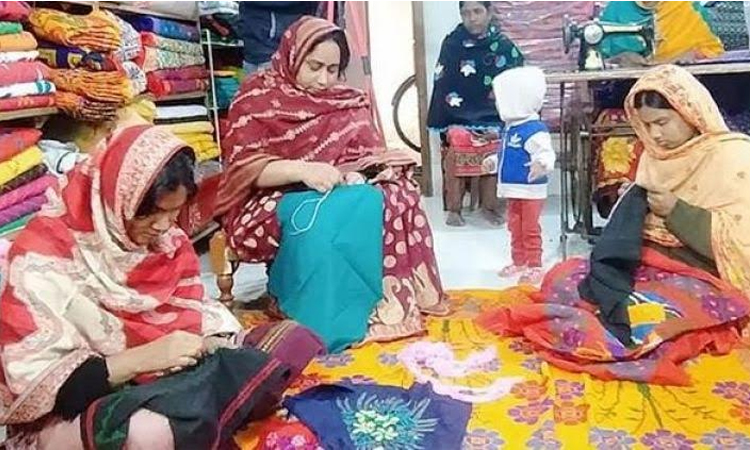News Flash

By Md Aynal Haque
RAJSHAHI, June 21, 2025 (BSS)-'Nakshi Kantha', a traditional embroidered quilt, has found a place among the urban middle and upper-class people in recent years.
These embroidered quilts, once made for domestic use, have evolved into a flourishing cottage industry, empowering women and showcasing a rich cultural heritage.
It has very potential needs and can go a long way if backed with systematic government patronage and appropriate facilities. Nakshi kantha flourishes women's entrepreneurship in Rajshahi region.
It is also a significant source of income for women in the Rajshahi region, transforming them into entrepreneurs.
For generations, women artisans have been sewing Nakshi Kantha and it is more than just needlework; it has become the emotions, memories and dreams of the artisan.
A new potential life of Shahnaz Khatun, 54, has been revealed after being involved in making Nakshi Kantha within the last couple of years.
Currently, she's making kantha in digital methods after the best uses of modern technology quickly transformed her into a latent entrepreneur.
Khatun, a resident of Jogipara village under Bagatipara Upazila in Natore district, has started the kantha making venture with a capital of Tk 1,700 in 2019.
First of all, she became inspired after seeing the embroidered kantha making process in a block boutique shop at RDA Market in Rajshahi. Since then she has been doing the work in their dwelling house successfully.
At present, she gets orders in her house and earns a profit worth around Tk 7,000-8,000 per month after selling her finished product.
"I need around one week to finish the sewing and designing work of a kantha," Khatun said, adding that her venture has created employment scopes for many women in her locality.
Like Khatun's venture, nakshi kantha has been a godsend to many rural poor women here as they are sewing their new day's dream by beating long-time poverty through stitching the country's traditional kantha commercially.
"I employ around 250 women in my industry," says Dinesh Hasda, from Kakonhat under Godagari upazila, who established his business entity named 'Adivasi Santa kantha' as an entrepreneur in 2013.
"I supply fabrics and yarns, and the women artisans are paid between Tk 1,000 and Tk 1,500 for sewing Nakshi Kantha each depending on the size," he said.
He said his business house produces as many as 1000 Nakshi Kanthas per month, as he designs Kanthas and supplies them to his workers for sewing.
"Our finished products are now being exported to around 15 overseas countries through a non-government development organization, Prokritee Bangladesh, in Dhaka," Dinesh Hashda said.
He told BSS that the business volume is now on a rising trend significantly and on average, Nakshi Kanthas are being sold by around Taka 25 lakh yearly, whereas his initial investment was Taka one lakh.
"In this area, people are known for their Nakshi Kantha skills," remarks Sheuly Basko, 48, a housewife and Nakshi Kantha artisan from Sorsonipara village in Godagari upazila.
"From our rich artistic heritage we can earn handsomely," she said. "I was inspired to sew nakshi kantha by other women in my area," says Monwara Begum, 46, from the same area.
She doesn't only sew herself but also coordinates the efforts of several others. "I make up to Tk 3,800 per month," she said.
"A Nakshi Kantha takes between one and two weeks to make, depending on the design," says Adiba Khatun, 35, from Kakonhat area, who has been involved in the industry for around ten years.
Khatun said the cost of making 'Nakshi Kantha' is minimal, but the value and time-consuming embroidery work make it luxurious and valuable.
A medium-sized quilt takes 2-3 months to complete and is valued at around 1000 to 10,000 taka. The profit margin is sufficient due to the availability of old clothes, she added.
Taharima Begum Lucky is a successful woman entrepreneur who has played a significant role in commercialising the traditional quilt. She is the proprietor of an organisation called Nur Nakshi where they use old clothes to make Nakshi Kanthas of various designs.
These quilts are then sold both at home and abroad. More than a thousand women are employed by Taharima and help make the venture successful.
Currently, around 2,200 women work for Nur Nakshi. Most of these women are from marginalised communities.
These employees are the heart of the company as they work to supply the end product according to orders that are later supplied to showrooms around the country and are even exported abroad.
The company has employees in different locations, including Chapainawabganj city, Amanura, Shibganj, Ranihati, Mahishalbari, Rahanpur, and Godagari, among others.
Talking to BSS, Taharima said that the workers are given everything from needle-threads, clothes and designs which are provided by 20 commissioned agents of the company.
Women then work as per the demand and at the end of the task, they are paid accordingly, which plays a significant role in making women financially independent.